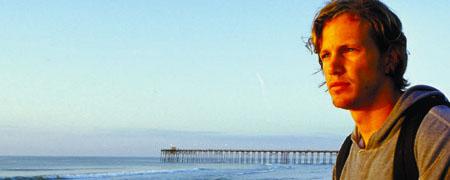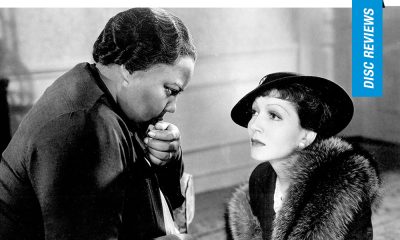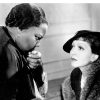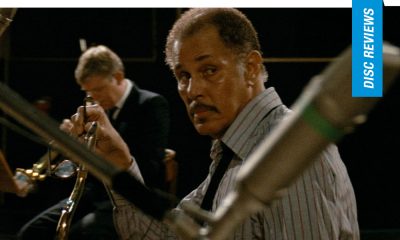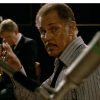Disc Reviews
Criterion Collection: La Jetee and Sans Soleil | Blu-ray Review
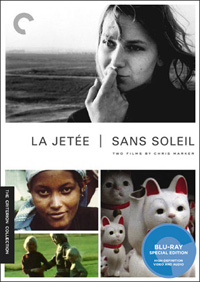 Little defense is needed for these two works by Chris Marker. While neither the first nor last films that he made, La Jetée (1962) and Sans Soleil (1983) effectively bookend Marker’s ‘major’ period, in which he made canonical political films like Le joli mai, Far from Vietnam, and Grin Without a Cat. The films in this set aren’t nearly as overtly political as any of those are, for they more keenly exemplify his interest in form and explorations of imagination. With the former film inspiring a plethora of homages (most notably, Gilliam’s Twelve Monkeys) and the latter spawning a style of free-form cinema diary that would later be evoked in films by Agnès Varda and Jonathan Caouette, among many others, Marker’s role as a pioneer in the latter half of the 20th century is hardly arguable.
Little defense is needed for these two works by Chris Marker. While neither the first nor last films that he made, La Jetée (1962) and Sans Soleil (1983) effectively bookend Marker’s ‘major’ period, in which he made canonical political films like Le joli mai, Far from Vietnam, and Grin Without a Cat. The films in this set aren’t nearly as overtly political as any of those are, for they more keenly exemplify his interest in form and explorations of imagination. With the former film inspiring a plethora of homages (most notably, Gilliam’s Twelve Monkeys) and the latter spawning a style of free-form cinema diary that would later be evoked in films by Agnès Varda and Jonathan Caouette, among many others, Marker’s role as a pioneer in the latter half of the 20th century is hardly arguable.
La Jetée is a work of science fiction, and perhaps one of the first and only films of the genre to truly tie in the ‘fiction’ term with its root in literature. The formal aesthetic, which is almost entirely voice-over narration over a sequence of still images, harkens back to early pre-cinema narratives, slide-projection lectures, and picture books. The latter is ironic, since its themes are antithetical to anything ever found in the storybook wonderland of children’s book or the objective information sessions of a lecture; this is a highly stylized, elliptical nightmare about the end of the world, both globally and personally. Simultaneously simple and perpetually complex, La Jetée lives on as Marker’s most notorious masterpiece precisely because it not stops overing new modes for being interpreted, while at the same time interpreting itself before our very eyes.
That last point is taken and gloriously spiraled into about twenty years later with San Soleil. Sternly linked with the ‘essay film’ aesthetic and structure, the film slyly sidesteps all of the conventions of that form to shape-shift countless times before our eyes, defying the organized stoicism that characterizes so many essay films. While the effect can be off-putting, even impenetrable, the patient and adventurous viewer gets swept away in its impressionistic stream-of-conscious flow. In the guise of a vacation diary, a woman narrates Marker’s observations of foreign cultures (primarily Japan) as if he were a fictional, Robinson Crusoe-esque character (or many different ones). Zooming from one thought to another and then to another, injected with anecdotes left and right, the effect is downright inebriating by the time we arrive at its Vertigo intermission.
Marker, a longtime fanatic of Hitchcock’s most critically acclaimed and revered film (he has seen it 19 times, according to the narrator), here takes a breather from the ethnographical probing to shift gears into cinephile mode. Visiting locations from the film in-person, the filmmaker seems to become momentarily possessed by Stewart’s Scottie, obsessively trailing a truth that is always beyond his grasp. Seemingly a non-sequitur (which is saying something, given the free-for-all nature of everything before it), it no doubt makes sense on an emotional level, for Sans Soleil the object begins to feel the most foreign when it looks at what we are most familiar with (a Hollywood classic). Invariably, it’s the Vertigo obsessing that constitutes the most obvious link between this film and La Jetée (if this isn’t so obvious, some of the extra features in this set help to clarify). One of cinema’s most experimental and uncompromising filmmakers, nobody has explored time, memory, narrative structure, and imagination quite the way Marker did.
Disc Review
Image and audio quality are up to Criterion’s usual standards here, though they’d already been almost perfected on the original DVD release. Since both La Jetée and Sans Soleil were shot on 16mm, the ceiling was never very high for them. While some nice, fine grain is apparent on the blu-ray, a side-by-side comparison yields one of the least distinguishable DVD-to-blu comparisons possible. The most apparent upgrade, though, comes in em>Sans Soleil when Marker filmed off of TV monitors. On the blu-ray, the high resolution of the image makes the individual pixels clearly visible, where the DVD scrubs out that information.
The audio, improved from the mono Dolby Digital track on the DVD to lossless PCM on the blu offers a bit more of an oomph, though still nothing to write home about.
Two interviews with filmmaker Jean-Pierre Gorin
There are about 40 minutes total of Gorin discussing Marker, but that is split into two chunks – one for each film. For the one on La Jetée half of the menu, Gorin gives a general overview of Marker – his philosophies, his legacy, and a little bit about the film. The 17-minute bit for Sans Soleil proves to really be a valuable briefing on just what makes the film special; cutting back and forth from Gorin’s observations and clips from the film, it leaves one longing for a full-feature commentary track by Gorin on the film. The two interviews were shot in 2005 by the Criterion Collection specifically for this DVD release.
Chris on Chris, a video piece on Marker by filmmaker and critic Chris Darke
This is a 10-minute featurette on Chris Marker made in the late 90s by film critic Chris Darke. It has appeared on most DVD edition of La Jetée that have come out around the world despite being a bit light on material and valuable insight. There are, though, interviews with Michael Shamberg and Terry Gilliam embedded in here that are good to see, as well as a clip from Marker’s documentary on Akira Kurosawa, AK.
Two excerpts from the French television series Court-circuit (le magazine): a look at David Bowie’s music video for the song “Jump They Say,” inspired by La Jetée, and an analysis of Hitchcock’s Vertigo and its influence on Marker
These are both pretty short (two and ten minutes, respectively), but they’re playful, to the point, and even quite convincing in their theories (well, at least the Vertigo analysis is). Proposing that David Bowie is an alien from the future, the narrator of the former segment is hilariously frank and deadpan in offering his hypothesis for the cause of Bowie’s prescient genius. The latter segment on La Jetée as a film about Marker trying to enter the world of his favorite film, Hitchcock’s Vertigo, becomes difficult to dispute given the evidence provided, and, if nothing else, makes the 30-minute masterpiece all the more densely layered and enigmatic.
Junkopia, a six-minute film by Marker, Frank Simone, and John Chapman about the Emeryville Mudflats
This is the one extra feature that has been added for the Blu-ray edition of these films and cannot be found on the DVD. While it may seem slight, what with it being such a short film, it turns out to be a pretty nice supplement to San Soleil. This is not only because it is contemporaneous to that feature (made in 1981), but because it shows a more concise and focused example of the same style of filmmaking, i.e. appropriating found objects or environments from the Modern world, and making dystopian sci-fi out of it. The footage was all shot in Emeryville Mudflats while Marker was in Sn Francisco filming the Vertigo segment in San Soleil. The Mudflats, which no longer exists, was an outdoor art gallery filled with anonymously-made ‘junk’ sculptures. Marker, with this film, documented the sculptures in harmony with nature, weathered by time, often eroded or washed away from land, all set to an eerie synth score.
A booklet featuring an essay by Marker scholar Catherine Lupton, an interview with Marker, notes on the films and filmmaking by Marker, and more
This is the exact booklet from the DVD edition, page-for-page, but still one of Criterion’s most stacked compilations of essays, interviews, and whats-its. Catherine Lupton’s ‘Memory’s Apostle’ tidily links the twenty-year bridge between the two films, touching on movies inspired by each of them, as well as contextualizing them within Marker’s body of work. The middle section of the book is called ‘Scribblings on the Wall,’ and comprises short passages and curios relating in some way or another to one of the films. Pathéorama, written by Marker, is a one-page, sentimental recollection about the time he encountered the eponymous device, doctoring it to juxtapose images of – of course – his cat on top of still images from ‘movieland,’ such as Ben-Hur. The final section, called ‘Rare Marker,’ is an interview that was originally published in an issue of the French publication Libération in 2003. As the interview was conducted to commemorate the first DVD release of Sans Soleil and La Jetée in France, many of the questions touch on the digitization of film and art, as well as the ‘problem’ of internet distribution, etc.; quite current topics even nine years later.
Final Thoughts:
As Gorin mentioned in one of his interviews, the ‘essay film’ is one of the most diverse and difficult genres of cinema for a filmmaker to make. So, too, is it one of the most difficult to penetrate for viewers, with veneers of dry intellectualism that can feel hopelessly esoteric to even the most seasoned cinephiles. This is what makes this set so invaluable: it not only gives two of the best and most well-known works from the genre (and all of French cinema, even), but it contextualizes them with easy-to-swallow supplements that make all essay films seem less daunting. This is the rare package in which it is strongly recommended for every cinephile, even – maybe especially – if you dislike the film and/or essay films in general.



